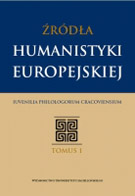Dzikie bajki zwierzęce Ludmiły Pietruszewskiej. Tradycja, awangarda, współczesność
Wild Animal Fables of Ludmila Petrushevskaya. Tradition, Avant-garde and Contemporary
Author(s): Paulina Wójcikowska-WantuchSubject(s): Literary Texts
Published by: Wydawnictwo Uniwersytetu Jagiellońskiego
Keywords: literatura współczesna; literatura klasyczna; humanistyka; żródła literackie; żródła języka; dziedzictwo kulturowe; kultura europejska; humanizm
Summary/Abstract: Ludmila Petrushevskaya was born in Moscow in 1938. She is a famous Russian writer, well-known for her dramatic plays and stories. Optimistic and multifarious fables are very different form her other works. They are an example of modern and original literature, unique combination of tradition and innovation. The most appreciated, both by critics and readers, fable series is Dikije żywotnye skazki (Wild Animal Fables). Both in the title of the series and the content of 244 fables, the author repeatedly refers to tradition of allegorical animal fable (Aesop fable), which enables us to draw an analytical parallel between her works and fables by the Greek writer. We can also notice in them an influence of postmodern philosophy and avant-garde poets, especially the group OBERIU. Petrushevskaya writes different kinds of fables, animal fables, fairy tales and anecdotes, some of them are traditional, other experimental. Their characteristic features, which we can notice also in “Wild animal’s fables”, are: puns, quotations, grotesque elements, absurd and ironic sense of humor. Petrushevskaya often takes traditional motifs and modifies them, so that they are easily understood by modern reader. Despite their original form, Ludmila Petrushevskaya’s fables raise universal existential problems, teach both children and adults how to behave and give a lot of fun. What is more, they are also critical of our contemporary world and commercial society.
Journal: Źródła humanistyki europejskiej. Iuvenilia Philologorum Cracoviensium
- Issue Year: 2011
- Issue No: 3
- Page Range: 149-161
- Page Count: 13
- Language: Polish

